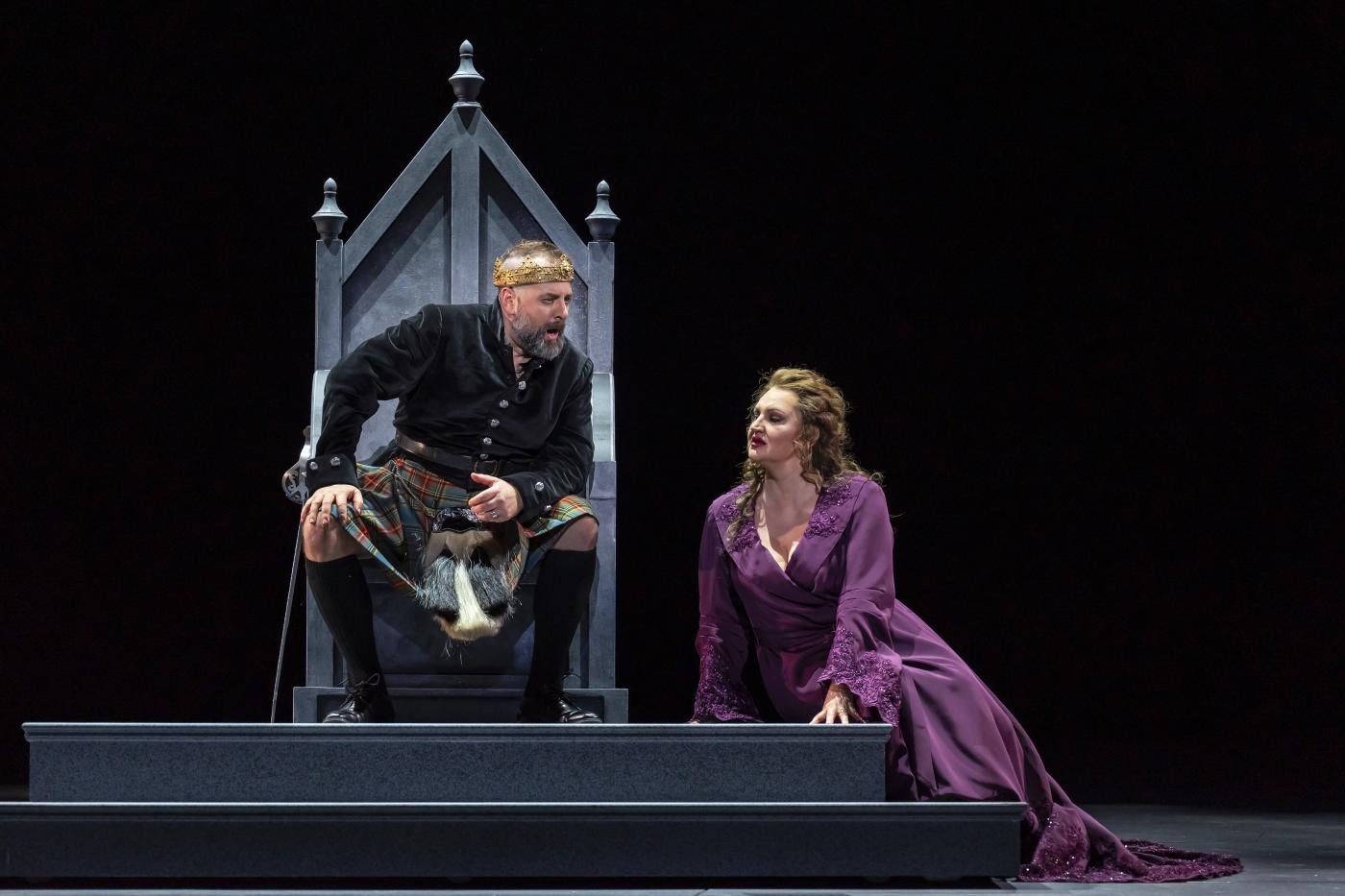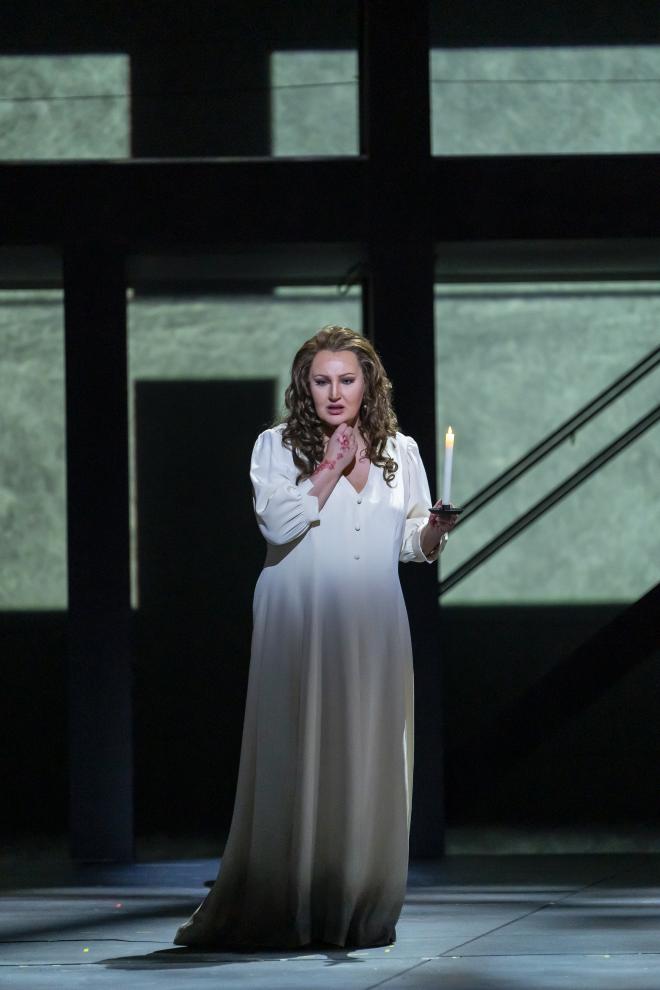“Out, damned spot! Out, I say! All the perfumes of Arabia will not sweeten this little hand.”
Washington National Opera presents Verdi’s Macbeth for the first time in 17 years, November 13-23 at the Kennedy Center Opera House.
Soprano Ewa Płonka takes us into the soul of Lady Macbeth. As you will see from this fascinating chat, Ewa Plonka is a consummate musician, artist, philosopher and even--psychologist!
Nicole Lacroix: It’s interesting that WNO’s first two operas this season are about marriages. In Fidelio, the wife’s love saves her husband and his countrymen from oppression. Whereas in Macbeth, the wife’s demonic thirst for power condemns her marriage and oppresses her countrymen.
Ewa Płonka: I don’t think those stories are about marriage at all.
Opera Fidelio is about moral choice we are all faced with in life. It’s about having the courage to listen to the inner morality. As we learn from history, any action limiting the freedom of others is an act of breaking the universal moral code. There are countless examples: taking another’s life, enslaving, limiting human and civil rights, women's right to vote, just to name a few. The times change, and as our awareness evolves so do civil laws. However, there is an inner compass we all should tune into and follow, the universal moral law within us.
And this is what Fidelio is about- Leonora had the courage to surpass the tyranny of her times. Not everyone is brave enough to stand against the broken system. However, it is love that serves as her inner compass to rescue her husband. Very often in stories/legends/myths etc. women in love represent the heart, our heart which helps us, if we let it, overcome all troubles by giving us hope, being the seat of love.
However, wouldn’t it be beautiful if we all stood up for each other no matter the relation? Husbands, wives, parents, children, why do those we are related to matter more than the rest of us! We are, after all, one!
Macbeth is a different story all together.
Shakespeare constructed the plot in multidimensional layers, it’s a bit more complicated. I’m sure we are familiar with Shakespearian writing but let’s quickly recap: Macbeth is mainly about power. It is a skillfully crafted timeless essay about making choices. It does include supernatural forces in the form of witches. However, we humans like to blame external factors on our tendencies or lack of taking full responsibility for our actions.
NL: Macbeth is an exhausting opera to see because of its emotional power.
EP: I think it’s very important to study this story and watch it, and then rewatch it time and again to learn from it. I’m sure it isn’t easy to look into the mirror of that part of human nature.
I feel privileged that my voice fach [voice range] allows me to portray characters with so much depth from whom we all may learn a great deal. As we know, there are also roles that mainly portray love triangles and other entertaining subjects. But heroines that I’m to portray demand bigger, darker voices, something one must be born with and properly develop.
NL: Is it extremely difficult to sing the role of Lady Macbeth?
EP: It is not easy as a soprano is asked to be able to sing it all: very loud-almost threatening dramatic phrases, in soft whisper-like manner, lyrically, extremely high, strong low notes, fast coloratura passages as well as slow, long, luscious phrases, it certainly has a lot to do with the construct of her character, her split personality, her inner battle which she loses and goes mad toward the end of the opera.
The art serves that purpose precisely, to show who we truly are in the most clever way so we feel inspired to change, to choose better, to follow the good in us. We live in dual reality, it’s a fact, which consists of both good and evil, black and white, Ying and Yang, plus and minus etc.
This story is a warning of what might happen if we do follow the bad thoughts, succumb to our most dark desires and more importantly - act on them.
There is more to it, of course. In XIth century Scotland, women had zero rights, were treated as breeding assets with no voice, truly dark ages. Ask yourself a question: how brilliant women coped during those times? How did they find an outlet for their wits, intelligence, inner strength, ambition or courage? Let’s not forget that Macbeth is quite a weak man who succumbs easily to all sorts of manipulation whether from king, his wife or supernatural forces.
In this story the first bad deed is a battle between good and evil in us. The rest, perhaps, are inevitable to cover it up, and so it goes.
What would you do if you had a mind with brilliant ideas but no one listened? Something to think about. We don’t know why Lady Macbeth wanted the power, perhaps to live through the eyes of her husband to taste it. Perhaps to continue to manipulate him into using it according to her ideas. Whether good or bad, we can only speculate. Or perhaps, since they don’t have children to preoccupy her mind with other life opportunities since raising the family wasn’t available to her, assuming that making the choice of not having children was not an option back in the days.
NL: What are the pillars of the role and what do they demand in both acting and singing? (The letter scene, La Luce langue, the brindisi, and finally the Sleepwalking Scene.) How do you build the character from one scene to the next?
EP: I build every character by analyzing it carefully, imagining the state in which my characters are at that particular moment, given this or that information from their surroundings, this being a response from stage partner, music, change of action, each particular word etc. Most importantly however, by listening to (also orchestra) the music which sets the atmosphere of the characters’ state of mind. There is a lot of information already there, we just need to follow the clues in the score, something I’m perhaps overtrained at during my many years of studying the art of piano solo. I’m prepared to recognize, name and interpret harmonic, rhythmic, dynamic and melodic structures of the piece to understand how Verdi and any other great composer wanted the characters to live in the world they created for them.
Verdi leaves us clues in music giving the hidden meanings to the words. We can’t forget that in life we can say one word in many different ways, interpretation of which one seeks in speed (in music-tempo), dynamics, melody, rhythm and emotions (in music -harmony). Those are the road signs we read to interpret the characters. It’s all in the score. And on top of it singers sprinkle the interpretation of conductors, directors, set design, even costumes -lines would be spoken /sung differently in modern and period costumes, the posture would be different etc etc. Possibilities are endless. However, it is the singer who at the end of the day lets the ray of foreign light go through their own prism and this is where all the fun is.
NL: Tell us about the Sleepwalking Scene in Act IV (tessitura [vocal range], interpretation)
EP: The Tessitura of this aria is spread all over the range, and the brutal high d-flat at the end of long opera for Lady Macbeth is just unkind on the part of Mr. Verdi (laughter). It probably had a lot to do with the casting of the very first Lady Macbeth but also, again, a clue of how to sing it. The score instructs the voice- technically speaking on edges of vocal cords.
In terms of interpretation, that’s the hardest part of the opera. After 4 acts of using the entire voice one needs to find delicate singing which requires unbelievable strength of the muscles to hold the line in perfect positions. Of course, many singers chose to sing it falsetto, but I strive for the real supported singing in every phrase. It’s important to me not to let go, not one note, to deliver fully the brilliance of this genius music to the audiences. And we have so many opportunities to do so here at the Kennedy Center. There are six shows only one day apart, now that’s something extremely difficult I must say. Come to hear and see the beautiful new production prepared carefully by Brenna Corner and Maestro Evan Rogister with one of my favorite places to be, amazing Washington National Opera with its brilliant Chorus and the Orchestra.
NL: What do you like about the role? What do you dislike?
EP: I always distinguish the character and the vocal part in terms of likes and dislikes. I like all my characters because I like to be challenged. I can’t judge them, it’s not ethical, it’s almost like a doctor who can’t judge their patients but is there to help them. The same with my characters, I’m here to help them come alive so they must become part of my fabric or/and I become part of theirs. It’s somewhat blurry line, a bit dangerous at times, but I’m eager to walk it and in the wings when my turn comes to go onstage, I feel as if I let my vessel be temporarily overridden by the character. It’s magical.
In terms of the music, it’s an absolute masterpiece. One of my absolute favorite roles to sing. The writing is spotless, brilliant, beautiful, believe me, it’s not always the case!
There is maybe the only thing I particularly am not enjoying every time, the long and challenging ensembles for the leading characters who already are singing so much in the course of the evening. But that’s Verdi, he wrote brilliant arias, duets, AND ensembles. Can’t have one without the other, it’s a joy!
Soprano Ewa Płonka sings the role of Lady Macbeth. The cast features Etienne Dupuis as Macbeth, Kang Wang as Macduff, and Soloman Howard as Banquo. Evan Rogister conducts the Kennedy Center Opera House Orchestra. Click here for more information.
PBS PASSPORT
Stream tens of thousands of hours of your PBS and local favorites with WETA+ and PBS Passport whenever and wherever you want. Catch up on a single episode or binge-watch full seasons before they air on TV.

